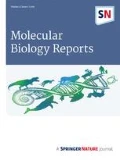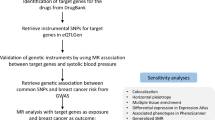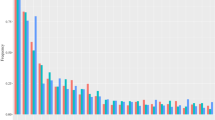Abstract
Previous studies investigating the association between TP53 Arg72Pro polymorphism and bladder cancer risk reported controversial results. To quantify the strength of association between TP53 Arg72Pro polymorphism and bladder cancer risk, we performed this meta-analysis. We searched PubMed, Embase and Wangfang databases for studies relating the association between TP53 Arg72Pro polymorphism and bladder cancer risk. We used the pooled odds ratios (ORs) with their 95 % confidence intervals (95 % CIs) to assess the association. Finally, data were available from a total of 16 case–control studies including a total of 5, 545 subjects (2,345 cases and 3,200 controls). Meta-analysis of all 16 studies showed TP53 Arg72Pro polymorphism was not associated with bladder cancer risk (All P values were more than 0.10). Subgroup analyses by ethnicity showed that TP53 Arg72Pro polymorphism contributed to bladder cancer risk in East Asians in three genetic models (For Pro vs. Arg, Fixed-effects OR 1.18, 95 % CI 1.05–1.32; For ProPro vs. ArgArg, Fixed-effects OR 1.40, 95 % CI 1.11–1.77; For ProPro vs. ArgPro/ArgArg, Fixed-effects OR 1.32, 95 % CI 1.07–1.62). However, there was no significant association in Caucasians and the others (All P values were more than 0.05). Heterogeneity analyses suggested ethnicity was the major sources of heterogeneity. Thus, meta-analyses of available data suggest the Pro variant of TP53 Arg72Pro contributes to bladder cancer risk in East Asians. Besides, TP53 Arg72Pro polymorphism may have race-specific effects on bladder cancer risk and further studies are needed to elucidate this possible effect.



Similar content being viewed by others
References
Siegel R, Naishadham D, Jemal A (2012) Cancer statistics, 2012. CA Cancer J Clin 62:10–29
Kaufman DS, Shipley WU, Feldman AS (2009) Bladder cancer. Lancet 374:239–249
Taioli E, Raimondi S (2005) Genetic susceptibility to bladder cancer. Lancet 366:610–612
Chipuk JE, Bouchier-Hayes L, Kuwana T et al (2005) PUMA couples the nuclear and cytoplasmic proapoptotic function of p53. Science 309:1732–1735
Riley T, Sontag E, Chen P et al (2008) Transcriptional control of human p53-regulated genes. Nat Rev Mol Cell Biol 9:402–412
Dumont P, Leu JI, Della Pietra AC III et al (2003) The codon 72 polymorphic variants of p53 have markedly different apoptotic potential. Nat Genet 33:357–365
Whibley C, Pharoah PD, Hollstein M (2009) p53 polymorphisms: cancer implications. Nat Rev Cancer 9:95–107
Mabrouk I, Baccouche S, El-Abed R et al (2003) No evidence of correlation between p53 codon 72 polymorphism and risk of bladder or breast carcinoma in Tunisian patients. Ann N Y Acad Sci 1010:764–770
Ye Y, Yang H, Grossman HB et al (2008) Genetic variants in cell cycle control pathway confer susceptibility to bladder cancer. Cancer 112:2467–2474
Srivastava P, Jaiswal PK, Singh V et al (2010) Role of p53 gene polymorphism and bladder cancer predisposition in northern India. Cancer Biomark 8:21–28
Pandith AA, Shah ZA, Khan NP et al (2010) Role of TP53 Arg72Pro polymorphism in urinary bladder cancer predisposition and predictive impact of proline related genotype in advanced tumors in an ethnic Kashmiri population. Cancer Genet Cytogenet 203:263–268
Kuroda Y, Tsukino H, Nakao H et al (2003) p53 Codon 72 polymorphism and urothelial cancer risk. Cancer Lett 189:77–83
Soulitzis N, Sourvinos G, Dokianakis DN et al (2002) p53 codon 72 polymorphism and its association with bladder cancer. Cancer Lett 179:175–183
Zhang R, Chen W, Zhang W et al (2011) Genetic polymorphisms of p53 codon 72 and bladder cancer susceptibility: a hospital-based case-control study. Genet Test Mol Biomarkers 15:337–341
Wu WJ, Kakehi Y, Habuchi T et al (1995) Allelic frequency of p53 gene codon 72 polymorphism in urologic cancers. Jpn J Cancer Res 86:730–736
Biros E, Kalina I, Salagovic J et al (2000) p53 single nucleotide polymorphisms and bladder cancer. Neoplasma 47:303–306
Horikawa Y, Nadaoka J, Saito M et al (2008) Clinical implications of the MDM2 SNP309 and p53 Arg72Pro polymorphisms in transitional cell carcinoma of the bladder. Oncol Rep 20:49–55
Lin HY, Huang CH, Yu TJ et al (2012) p53 codon 72 polymorphism as a progression index for bladder cancer. Oncol Rep 27:1193–1199
Chung CJ, Huang CJ, Pu YS et al (2008) Polymorphisms in cell cycle regulatory genes, urinary arsenic profile and urothelial carcinoma. Toxicol Appl Pharmacol 232:203–209
Lin HY, Huang CH, Yu TJ et al (2011) p53 codon 72 polymorphism was associated with vulnerability, progression, but not prognosis of bladder cancer in a Taiwanese population: an implication of structural equation modeling to manage the risks of bladder cancer. Urol Int 86:355–360
Santos LE, Guilhen AC, de Andrade RA et al (2011) The role of TP53 PRO47SER and ARG72PRO single nucleotide polymorphisms in the susceptibility to bladder cancer. Urol Oncol 29:291–294
Chen WC, Tsai FJ, Wu JY et al (2000) Distributions of p53 codon 72 polymorphism in bladder cancer–proline form is prominent in invasive tumor. Urol Res 28:293–296
Toruner GA, Ucar A, Tez M et al (2001) P53 codon 72 polymorphism in bladder cancer–no evidence of association with increased risk or invasiveness. Urol Res 29:393–395
Attia J, Thakkinstian A, D’Este C (2003) Meta-analyses of molecular association studies: methodologic lessons for genetic epidemiology. J Clin Epidemiol 56:297–303
Salanti G, Amountza G, Ntzani EE et al (2005) Hardy-Weinberg equilibrium in genetic association studies: an empirical evaluation of reporting, deviations, and power. Eur J Hum Genet 13:840–848
Sayed-Tabatabaei FA, Houwing-Duistermaat JJ, van Duijn CM et al (2003) Angiotensin-converting enzyme gene polymorphism and carotid artery wall thickness: a meta-analysis. Stroke 34:1634–1639
Zintzaras E, Raman G, Kitsios G et al (2008) Angiotensin-converting enzyme insertion/deletion gene polymorphic variant as a marker of coronary artery disease: a meta-analysis. Arch Intern Med 168:1077–1089
Mantel N, Haenszel W (1959) Statistical aspects of the analysis of data from retrospective studies of disease. J Natl Cancer Inst 22:719–748
DerSimonian R, Laird N (1986) Meta-analysis in clinical trials. Control Clin Trials 7:177–188
Higgins JP, Thompson SG, Deeks JJ et al (2003) Measuring inconsistency in meta-analyses. BMJ 327:557–560
Cochran WG (1954) The combination of estimates from different experiments. Biometrics 10:101–129
Thompson SG, Higgins J (2002) How should meta-regression analyses be undertaken and interpreted? Stat Med 21:1559–1573
Burchard EG, Ziv E, Coyle N et al (2003) The importance of race and ethnic background in biomedical research and clinical practice. N Engl J Med 348:1170–1175
Bhopal R (2004) Glossary of terms relating to ethnicity and race: for reflection and debate. J Epidemiol Community Health 58:441–445
Stuck AE, Rubenstein LZ, Wieland D (1998) Bias in meta-analysis detected by a simple, graphical test. Asymmetry detected in funnel plot was probably due to true heterogeneity. BMJ 316:469
Egger M, Davey Smith G, Schneider M et al (1997) Bias in meta-analysis detected by a simple, graphical test. BMJ 315:629–634
Chen YC, Xu L, Guo YL et al (2004) Polymorphisms in GSTT1 and p53 and urinary transitional cell carcinoma in south-western Taiwan: a preliminary study. Biomarkers 9:386–394
Gao W, Romkes M, Zhong S et al (2010) Genetic polymorphisms in the DNA repair genes XPD and XRCC1, p53 gene mutations and bladder cancer risk. Oncol Rep 24:257–262
Jiang DK, Ren WH, Yao L et al (2010) Meta-analysis of association between TP53 Arg72Pro polymorphism and bladder cancer risk. Urology 76(765):e761–e767
Vousden KH, Lane DP (2007) p53 in health and disease. Nat Rev Mol Cell Biol 8:275–283
Ioannidis JP, Patsopoulos NA, Evangelou E (2007) Uncertainty in heterogeneity estimates in meta-analyses. BMJ 335:914–916
Conflict of interest
The authors declare no conflict of interest.
Author information
Authors and Affiliations
Corresponding author
Rights and permissions
About this article
Cite this article
Liu, ZH., Bao, ED. Quantitative assessment of the association between TP53 Arg72Pro polymorphism and bladder cancer risk. Mol Biol Rep 40, 2389–2395 (2013). https://doi.org/10.1007/s11033-012-2319-z
Received:
Accepted:
Published:
Issue Date:
DOI: https://doi.org/10.1007/s11033-012-2319-z




